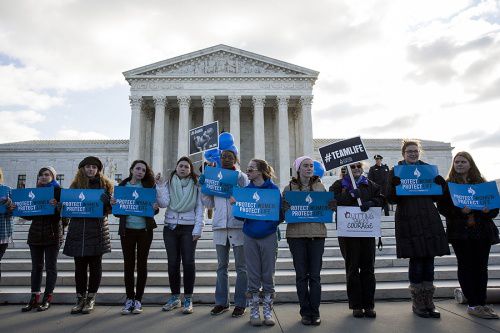As the Supreme Court heard arguments about a Texas law requiring abortion clinics to meet higher medical standards, advocates outside the court said the regulations are about protecting women’s health.
For Nona Ellington, the case is a personal one.
Standing outside the Supreme Court on Wednesday, she told EWTN about her own experience of undergoing an abortion in Texas as a teenager. Rather than solving her problems, she said, the procedure resulted in lasting complications that continue to haunt her to this day.
“As a result of that abortion at age 15, I’m no longer able to have children,” she said. “I had five miscarriages instead.”
And these miscarriages led to in life-threatening complications of their own, including tubal pregnancies and a ruptured fallopian tube that resulted in “near death experiences.”
Ellington said that she also suffered severe psychological effects after the abortion, including suicidal thoughts and attempts to take her own life.
Now, she is taking a stand against “shoddy abortion clinics” and warning that abortion is “a very dangerous procedure.”
“I believe women’s health should be protected no matter what kind of facility they’re in,” Ellington said, voicing her support for additional regulations in the industry to protect women should complications arise.
Inside the court, the justices heard a challenge to a Texas law that requires abortion clinics in the state to conform to the same regulatory health standards as ambulatory surgical centers.
Under these health standards, abortion doctors must have admitting privileges at a hospital within 30 miles in case of a medical emergency resulting from an abortion. In addition, final regulations increased the required number of staff at clinics, as well as mandating building requirements such as a designated operating room.
Critics say that the law’s regulations could result in 75 percent of Texas abortion clinics closing, due increased operating costs or lack of additional real estate to conform to the regulations. Most remaining clinics would be in urban areas, critics say, creating a substantial burden on women seeking abortions.
The state of Texas, defending the law, argues that the medical consensus is split on the need for the regulations, and so it is within the state’s power to act if it sees the need for oversight of clinics.
The law “does provide a continuity of care,” insisted Aimee Murphy, founder of Life Matters Journal, in an interview with CNA outside the Supreme Court.
Abortion doctors may only see a patient once, with no follow up, she observed.
“If abortion is a surgical procedure, why are we not treating it with the same weight, with the same responsibilities that we do all other surgical procedures?”
And contrary to what abortion advocates say, “it’s not an inherently safe procedure,” she said, pointing to statistics indicating that over 400 women have died from abortion since it was legalized in 1973. And many more women — including Nona Ellington — have suffered complications, miscarriages, and psychological disorders directly relating to an abortion, Murphy said.
Inside the Court, the oral arguments focused on whether the law’s intent was to place an “undue burden” on the right of women to have an abortion, as prohibited in the Court’s 1992 decision Planned Parenthood v. Casey.
The law puts “heavy burdens on abortion access that are not medically justified,” said Stephanie Toti, challenging the Texas legislation before the Court. She pointed to clinics closing throughout the state in anticipation of the law’s enactment or right after it was enacted.
Texas Solicitor General Scott Keller argued that the bill was passed in the wake of the Kermit Gosnell scandal, and had the intent of preventing future cases like his clinic, which fell so far below proper medical standards that a woman died from neglect.
In the first lawsuit filed against the law, “Planned Parenthood admitted that over 210 women annually are hospitalized because of abortion complications,” he added.
There is no reason to expect a Gosnell scenario in Texas, Justice Elena Kagan argued, as the state allows for constant inspections of clinics. Justice Samuel Alito countered that the scenario is already taking place, with amicus briefs in the case showing clinics cited for “appalling” health violations.
Alito questioned whether the law directly resulted in the closure of abortion clinics, bringing up other possible factors like cuts to state family planning funds. Kagan argued that the legislation was responsible for the closings, noting that clinics opened when the law was stayed by a court and closed when it was subsequently re-enacted.
The regulations also enforce “basic safety” like wider hallways to allow quick transport of women on a stretcher to an ambulance in case of a medical emergency, Alito noted.
“This is one of the lowest-risk procedures,” Justice Ruth Bader Ginsburg insisted of early-stage abortions, suggested that the regulations were unnecessary. Other procedures like colonoscopies pose much more risk and yet are not regulated like abortions, Justice Sonia Sotomayor said.
After hearing oral arguments in the case March 2, the Supreme Court is expected to issue its ruling later this year. The recent unexpected death of pro-life Justice Antonin Scalia leaves a hole in the ideologically-divided body of justices, leaving the remaining eight members of the bench to issue the decision.
Still, pro-life advocates such as Kristen Day, executive director of Democrats for Life of America, hope that the court will side with the Texas law for the sake of women.
Day said in a statement that the regulations “bring oversight to an industry that generally lacks protections, just as Democrats did with the Occupational Safety and Health Act in 1970, when factory owners vouched that factories were safe places to work.”
“The Texas law is a model of Democratic values, putting the protection and safety of women over corporate interests,” she added.

